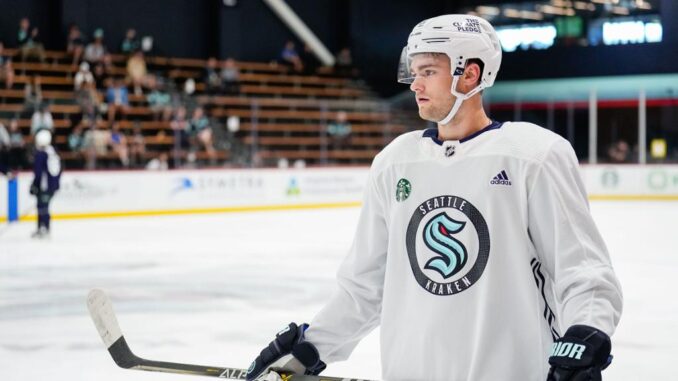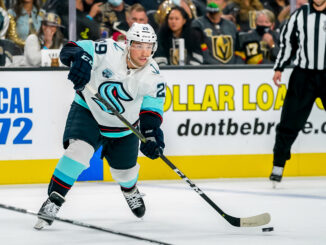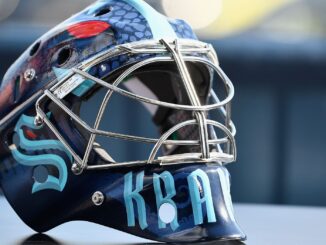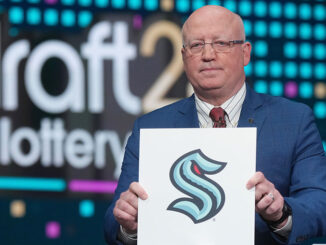
As the fourth-overall pick in the 2022 NHL Entry Draft, Shane Wright – once considered the top prospect in his class – was met with high expectations heading into his first professional season. He tore up the Ontario Hockey League (OHL) in 2021-22, tallying 108 points in 74 regular-season and playoff games in his return from a one-year layoff due to the league’s COVID-19 shutdown. The extended reprieve hurt Wright’s draft stock as other prospects headed overseas to other circuits which resumed play. Even so, scouts still deemed the Kingston Frontenacs’ center worthy of a high draft slot, with the Seattle Kraken reaping the rewards of anxiousness within the industry.
Despite his draft pedigree and the Kraken’s lack of offensive star power – even with several offseason additions – Wright’s presence has been virtually non-existent on the ice. Considering the sizeable investment the franchise has made with their fourth-overall pick, their handling of Wright has been frustratingly misguided.
Miscommunication Between Hakstol and Francis Causing Issues
At the root of the problem is that head coach Dave Hakstol and general manager Ron Francis have opposing views about how to manage Wright’s ice time best. During the preseason, Francis suggested that Wright could play the entire season in the NHL, citing his vision and hockey sense as the biggest factors in determining his immediate playing future. Despite those comments, Wright’s start to the season has been turbulent, to say the least.
Although Wright remained with the Kraken after training camp, he hasn’t enjoyed the smoothest start to his NHL career. He’s played in only five of the team’s first ten games and has one assist to his name while playing fewer than seven minutes per game on average. For an offensively-gifted player who is used to being leaned on heavily in all situations, that deployment is antithetical to effective prospect development. For the good of his long-term growth, the Kraken should not drag their feet any longer and send Wright back to the OHL, where he can eat up minutes and be the focal point on a contender.
Some may believe in the benefits of observing the game from a bird’s-eye view and gaining confidence in a less demanding practice setting, but that does very little for a player projected to eventually play near the top of the lineup. If they were committing to keeping him out of the lineup entirely, his inconsistent usage would make sense. Instead, the team has sprinkled in sparse playing time with a string of healthy scratches, making it difficult for Wright to get into any sort of rhythm to solidify his role.
Related: 4 Seattle Kraken Observations – Beniers, Grubauer, And More
The NHL as a whole is very risk-averse, and Hakstol may feel the pressure of locking in wins with an improved roster, but keeping Wright out of real games is detrimental to his professional growth. He likely makes (many) mistakes as he acclimatizes to NHL play, but the alternative is going through rote practice drills free from the pressure of actual game action.
Even the league’s biggest stars would struggle to generate chemistry with their linemates or gain confidence by playing a meager five minutes a night. The top skaters at least have an established portfolio to fall back on in difficult times, something that Wright sorely lacks at this point in time.
The Kraken were not touted as Stanley Cup contenders heading into the season, so giving their top prospect more runway shouldn’t be seen as a massive concession on Hakstol’s part. If wins are so important that Wright’s growing pains are impossible to contend with, he should go somewhere where he can play regularly. The American Hockey League (AHL) is a non-option – more on that in the next section – further limiting potential routes to pursue for both Wright and the organization.
NHL-CHL Agreement Puts Wright in A Bind
Further complicating matters is the NHL’s slide-rule on entry-level contracts (ELCs) and the longstanding agreement between the NHL and the Canadian Hockey League (CHL) when it comes to prospects.
As detailed within the NHL’s current collective bargaining agreement (CBA), players under the age of 20 on an ELC can see their contract slide if they do not pass the designated nine-game threshold. For example, if Wright plays in 10 games this season, the first year of three on the ELC is burned. If not, his ELC extends an additional year and would expire after the 2025-26 season rather than after 2024-25.
With five appearances thus far, the Kraken can play Wright in four more games before having to make a decision on his immediate playing future. Although that flexibility is useful in most cases, prolonging Wright’s stay in NHL purgatory only takes away from the time he could be spending dominating the OHL and gaining valuable game time in high-leverage minutes. It should be noted that the Kraken can loan Wright to Canada for the IIHF World Junior Championships without affecting his contract status. However, doing so without carving out a bigger role for him at the NHL level only extends the uncertainty.
Related: NHL Expansion History Positive Sign For Seattle Kraken’s Second Season
For a few top prospects, the AHL represents a viable alternative to returning to the junior circuit, given its status as arguably the second-best professional hockey league in the world. It functions as a training ground for rising stars, a laboratory of sorts where skills can be honed away from the prying eyes of NHL crowds and big-league media contingents.
Unfortunately for those hailing from the OHL, the league’s pact with the NHL dictates that unless a player is either 20 years old or has played four junior seasons, they cannot be sent to the AHL. It’s a rule meant to keep the junior circuit sustainable as it functions as the NHL’s primary feeder league for players, but it puts prospects who are too good for juniors but not good enough for the top level in a difficult situation. Do you let the player gain confidence by running roughshod over weaker competition but run the risk of them developing bad habits or not being challenged enough? The OHL has valid reasons for wanting to retain its biggest talents, but those don’t always extend to the players themselves.
Return to Juniors the Optimal Move for Wright’s Development
All things considered, sending Wright back to juniors – either to his Frontenacs or while engineering a trade to an OHL powerhouse – appears to be the decision with the most long-term upside. Wright can repair his battered confidence while making up for his lost 2020-21 season and accumulating invaluable reps in all situations. A leading role with the national junior team would be sure to follow, and – for Canadian players at least – there is no bigger stage before entering the NHL limelight.
It’s at least three years into the future, but negotiating Wright’s second contract could be a contentious affair if he internalizes any ill will for this initial fumbling of his role with the big club. On top of stapling him to the bench when he does leave the press box, Wright was a healthy scratch with his grandparents in town, which only served to embarrass him further for no apparent reason. Others may argue that winning is the Kraken’s top priority, but if Wright is enough of a liability that he can’t even be trotted out for his minuscule serving of ice time, he shouldn’t be with the team.
The Kraken have mishandled Wright’s early NHL journey, but there is still time to get his development back on course. The young phenom should be piling up minutes and points, not healthy scratches. Let’s hope the organization either changes its tune, lest they jeopardize the development of one of their main building blocks for the future.
Data courtesy of Elite Prospects and the NHL.




